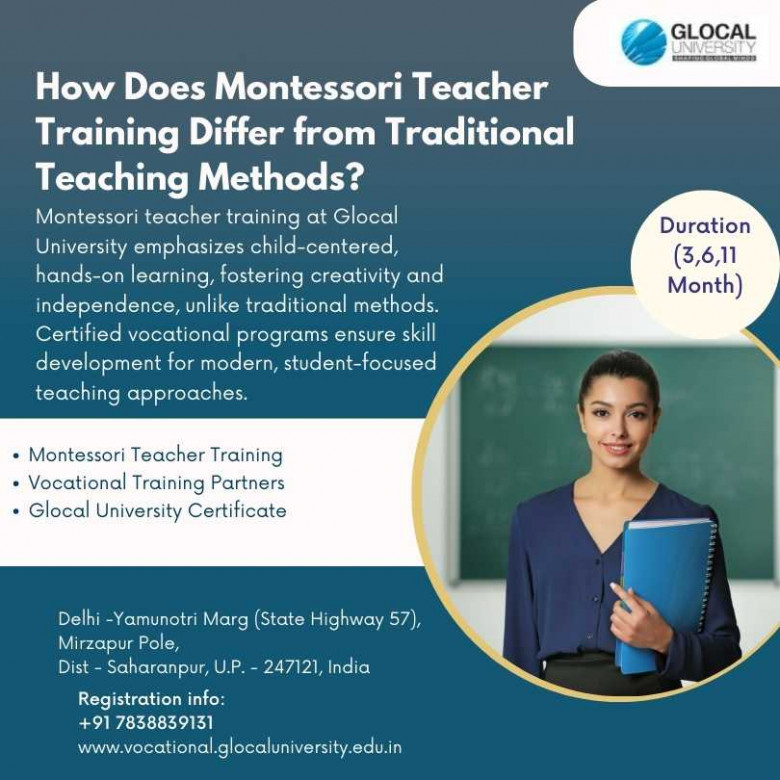views
How Does Montessori Teacher Training Differ from Traditional Teaching Methods?
Montessori teacher training is a revolutionary approach to education that empowers teachers to nurture creativity, independence, and holistic development in children. Unlike traditional teaching methods, which focus on rigid structures and standardized curriculums, Montessori training emphasizes child-centric learning, allowing students to explore, experiment, and grow at their own pace.
This article delves into the distinctive aspects of Montessori teacher training, its benefits, and how it differs from conventional teaching methods. It also highlights the role of vocational training programs in Montessori education and how institutions like Glocal University Vocational equip teachers with essential skills through recognized certifications.
Key Features of Montessori Teacher Training
Child-Centric Approach
Montessori training prioritizes the child’s interests and learning style over a fixed curriculum. Teachers are trained to observe and guide rather than dictate, creating an environment that fosters independence and curiosity.
Hands-On Learning
Montessori emphasizes experiential learning. Teachers learn how to create a prepared environment filled with materials that encourage hands-on exploration, helping children understand concepts deeply rather than memorizing facts.
Individualized Instruction
Unlike traditional methods where a single lesson is taught to the entire class, Montessori training equips teachers to tailor their approach to each child's developmental stage and needs.
Developmental Focus
Montessori education recognizes sensitive periods in a child’s development. Teachers are trained to introduce materials and activities that align with these critical learning windows.
Comparison with Traditional Teaching Methods
| Aspect | Montessori Teaching | Traditional Teaching |
|---|---|---|
| Learning Style | Individualized and hands-on | Uniform and lecture-based |
| Role of Teacher | Facilitator and guide | Authority figure |
| Curriculum | Flexible and child-driven | Fixed and standardized |
| Focus | Holistic development | Academic performance |
| Assessment | Observation-based | Test and exam-based |
Benefits of Montessori Teacher Training
Fosters Holistic Development
Montessori training equips teachers to nurture physical, emotional, social, and cognitive development, helping children grow into well-rounded individuals.
Promotes Creativity and Independence
Montessori-trained teachers encourage students to explore their creativity and learn through self-directed activities, fostering problem-solving and decision-making skills.
Builds Better Relationships
Montessori methods focus on respect and collaboration. Teachers learn how to create a supportive and empathetic environment, strengthening teacher-student relationships.
Encourages Lifelong Learning
Montessori training instills a love for learning in children, equipping them with skills that go beyond academics, such as critical thinking, adaptability, and self-discipline.
Role of Vocational Training in Montessori Education
Vocational training programs play a crucial role in Montessori teacher education, bridging the gap between theoretical knowledge and practical application. These programs focus on skill development and hands-on experience, ensuring teachers are well-prepared for real-world challenges.
Skill Development Training Partner
Organizations like Glocal University Vocational collaborate with skill development training partners to provide comprehensive Montessori training. These partnerships ensure high-quality education aligned with industry standards.
Vocational Training Certificate
A vocational training certificate from a recognized institution validates the teacher’s expertise, boosting employability and credibility in the field of education.
Practical Experience
Vocational programs emphasize internships and practice teaching, enabling trainees to apply Montessori principles in real classrooms.
Montessori Course Fees and Accessibility
Montessori training is available at various levels, including diploma, certificate, and advanced courses. The Montessori teacher training course fees vary depending on the program and institution, ranging from affordable short-term courses to more comprehensive certifications. Institutions like Glocal University offer cost-effective options without compromising on quality, making Montessori education accessible to aspiring teachers from diverse backgrounds.
Skills Acquired Through Montessori Teacher Training
Montessori training equips teachers with a unique skill set that distinguishes them from traditional educators. Key skills include:
Observation Skills
Teachers learn to observe children’s behavior, interests, and developmental milestones to provide tailored guidance.
Classroom Management
Montessori training emphasizes creating a calm and organized environment where children can learn independently.
Material Preparation
Teachers are trained to design and use Montessori materials effectively, promoting hands-on learning.
Communication Skills
Building rapport with children and parents is a critical aspect of Montessori education, and training programs focus on enhancing communication abilities.
Patience and Empathy
Montessori teachers are trained to be patient and empathetic, fostering a nurturing atmosphere for children.
Why Choose Glocal University for Montessori Training?
Glocal University Vocational stands out as a leader in vocational education, offering well-rounded Montessori training programs in collaboration with reputed vocational training partners. Key features of their programs include:
- Comprehensive Curriculum: Covering both theoretical knowledge and practical skills.
- Affordable Montessori Course Fees: Ensuring accessibility for all aspiring teachers.
- Vocational Training Certificates: Validating the teacher’s expertise and enhancing career opportunities.
- Experienced Faculty: Providing mentorship and guidance from industry experts.
- State-of-the-Art Facilities: Equipped with modern classrooms and Montessori materials for hands-on practice.
Career Opportunities in Montessori Education
Montessori-trained educators are in high demand globally. Career options include:
- Montessori school teacher
- Early childhood education specialist
- Curriculum developer
- Educational consultant
- School administrator
The skills gained from Montessori training also open doors to entrepreneurial ventures, such as starting a Montessori school or daycare center.
Read Also: How Does Montessori Teacher Training Differ from Traditional Teaching Methods?
Conclusion
Montessori teacher training offers a transformative approach to education, focusing on child-centered learning, creativity, and holistic development. Unlike traditional teaching methods, Montessori training empowers teachers to guide children toward becoming independent, confident, and lifelong learners.
Institutions like Glocal University Vocational provide top-notch training, combining theoretical insights with practical experience. With affordable Montessori teacher training course fees and recognized vocational training certificates, aspiring teachers can embark on a fulfilling career in Montessori education.
By choosing Montessori training, you are not just learning a teaching method—you are embracing a philosophy that nurtures the potential of every child.























Comments
0 comment